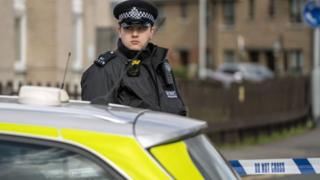Knife crime means 'frightened generation'
 Image copyright
Getty Images
Image copyright
Getty Images
The threat of knife crime is creating a "generation of very frightened young people", former Ofsted chief Sir Michael Wilshaw has said.
"We've always had youth crime," he told a committee of MPs. "But this is different. This is vicious."
Sir Michael said many young people were "fearful of their lives".
Metropolitan Police Assistant Commissioner Mark Simmons told MPs there would be a big increase in police officers based in schools.
Sir Michael warned the Education Select Committee's investigation into knife crime it was unacceptable that so many young people were afraid about getting home safely.
'Surrogate parents'
"We have a generation of young people who are frightened to go home in the evening, because they're worried about crossing the road into another postcode and ending in the territory of a gang they know will do them harm," he told MPs.
"We've got a generation of very frightened young people, who do well in school, but as soon as they leave the school gates are fearful of their lives."
In terms of improving safety and providing reassurance, Mr Simmons said the police's use of stop and search was an "effective measure to reduce the likelihood of people carrying knives".
But he said he recognised it was an "intrusive power" and needed to be guided by intelligence and from working with young people.
The assistant commissioner said the Metropolitan Police would be "investing heavily" in putting more police officers to work full-time in schools in the capital.
Mr Simmons said that there had already been an increase from 280 to 420 officers - and there was a target of having almost 600 officers in schools.
"We're recruiting currently to get to that point," said the assistant commissioner.
These safer-schools officers talk to young people about their safety and build community links, as well as carrying out weapon sweeps.
School exclusions
Asked if there was a link between teenagers excluded from school and knife crime, the assistant commissioner said exclusion was "one of the factors that crops up significantly" among those involved in knife crime but it was not necessarily a "causal relationship".
Robert Halfon, who chairs the committee, then said it was a "red herring" to debate whether exclusion was a direct "cause" of knife crime.
He said it was clear that the profile of pupils at risk of exclusion would be similar to those at risk of getting involved in crime - and the priority should be for "early intervention".
Sir Michael said schools often acted as "surrogate parents" in looking after children - and as a head teacher he was aware excluded pupils were in "great danger of being pulled into crime".
Keeping the most chaotic and volatile pupils in school was very expensive and required intensive staffing, he said.
And decisions about exclusions were now unquestionably being influenced by funding pressures on schools.
Gang violence
But he also highlighted that areas with the highest exclusion rates did not necessarily have high levels of knife crime.
Sir Michael said the driving factor in knife crime was more likely to be the "huge rise in serious gang violence" - and called on the police to tackle these gangs.
"Unless the police get hold of these gang leaders and do something about them at an early stage, then this problem will continue," he said.
But the Metropolitan Police assistant commissioner rejected this, saying it wasn't "that simple".
"The idea that if the police sorted out gangs, all the problems we're talking about would go away... I don't think that meets the point," said Mr Simmons.
He said the "gang culture" had many different aspects and layers of involvement and overlapped with many other issues, such as drug crime.
Meanwhile, Carlie Thomas, who works for the St Giles Trust with young people at risk of being involved in crime, warned the committee the problem of youth violence could escalate from knives to guns.
"We're losing lives left, right and centre," she said. "This really has to stop."